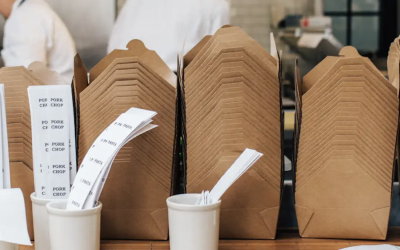The delivery industry isn’t lacking for youthful energy and big ideas. MealMe, a new and still-evolving service from a pair of recent college grads, combines an aggregator function to help consumers price compare delivery options from local restaurants with the ability to make a reservation and share food pics—but that’s just the tip of the iceberg. The company’s co-founders hope to expand the offering to give at-home chefs the ability to sell their prepared meals through the app. Described as a “moonshot idea” that could revolutionize the food-delivery landscape, MealMe […]
Read MoreA new study of U.S. consumers shows an increased willingness to pay more to order delivered meals directly from restaurants versus third-party apps, possibly signaling heightened awareness of delivery economics in the eyes of the average consumer.
Read MoreIn an effort to help restaurants navigate the recovery phase of the pandemic, DoorDash announced a new “Main Street Strong” initiative that includes new products, programs and policies to help restaurants survive and grow their businesses. That assistance includes helping restaurants set up online stores and $0 delivery fees on all orders from local restaurants every Saturday June, among others. Pulled from a press release on the announcement, the “Main Street Strong” campaign includes the following new efforts: DoorDash Storefront This new service enables restaurants to create their own online […]
Read MorePreferring the term “neighborhood kitchen” to ghost or virtual kitchen, Miami-based Reef Kitchens is a mixture of both, serving as a delivery-only hub for established restaurants and those that exist purely in online form within third-party delivery apps.
Read MoreEmbracing non-traditional operations as the new normal, the consultants at Figure 8 Logistics have teamed up with Zuul Kitchens, a New York City-based ghost kitchen operator, to advise restaurants on the full buffet of non-traditional restaurant models that are suddenly more viable as a quick return of dine-in customers still remains out of arm’s reach as infection rates keep rising outside of the cities hardest hit by the pandemic’s first wave. Focusing on delivery, carryout, ghost kitchens, virtual restaurants and repurposing existing restaurant square footage, the two consultants are diving […]
Read MoreAs more restaurants continue to do takeout, DoorDash is expanding its two-year-old customer pickup feature that shares customer location data so merchants can be alerted to them approaching the store to ease back-of-the-house operations. The company, which is the largest U.S. third-party delivery brand, says tens of thousands of merchants are now using the pickup platform to “help generate even more sales for merchants at zero cost to them.” The no-fee pickup option gives customers the ability to avoid delivery fees, if they’re feeling industrious enough to leave the house […]
Read MoreParTech, a restaurant and retail point-of-sale provider, has partnered with Restaurant Revolution Technologies and its Order One Maverick digital ordering product to help restaurants grow their off-premises business by offering more ways to order for delivery, curbside pickup and takeout. In a press release announcing the new service, the two brands said the new functionality is focused on employee engagement, guest engagement and allowing customers to pay however they like “whether it’s paying at a counter or tableside.” “Our goal for this most recent release is to firmly establish Brink […]
Read MoreReservation and booking platform Tock secured a $10-million investment round as it pivoted from in-person operations to off-premises enabler to help restaurants provide takeout and curbside meals. When COVID-19 hit, the restaurant industry came to a screeching halt, especially places where you need to reserve a table. Prior to the pandemic, that was the core function of Tock. The company served as a reservation, event booking and hospitality tool provider for about 3,000 restaurants and wineries before the pandemic hit. It had booked nearly $1 billion in payments for client […]
Read MoreSlice, a technology provider for independent pizza restaurants, secured a significant round of funding as it helps client businesses power through the pandemic. Pizza has been a big winner during the COVID-19 pandemic, Domino’s reported a 7.1 percent increase in same-store sales early on during the crisis. The mega chain, however, benefits from a massive tech budget and exceptional branding. The neighborhood pizzeria, however, just can’t compete with a technology stack like that. And that’s where Slice comes in. The company was built to help smaller pizza chains and mom-and […]
Read More










